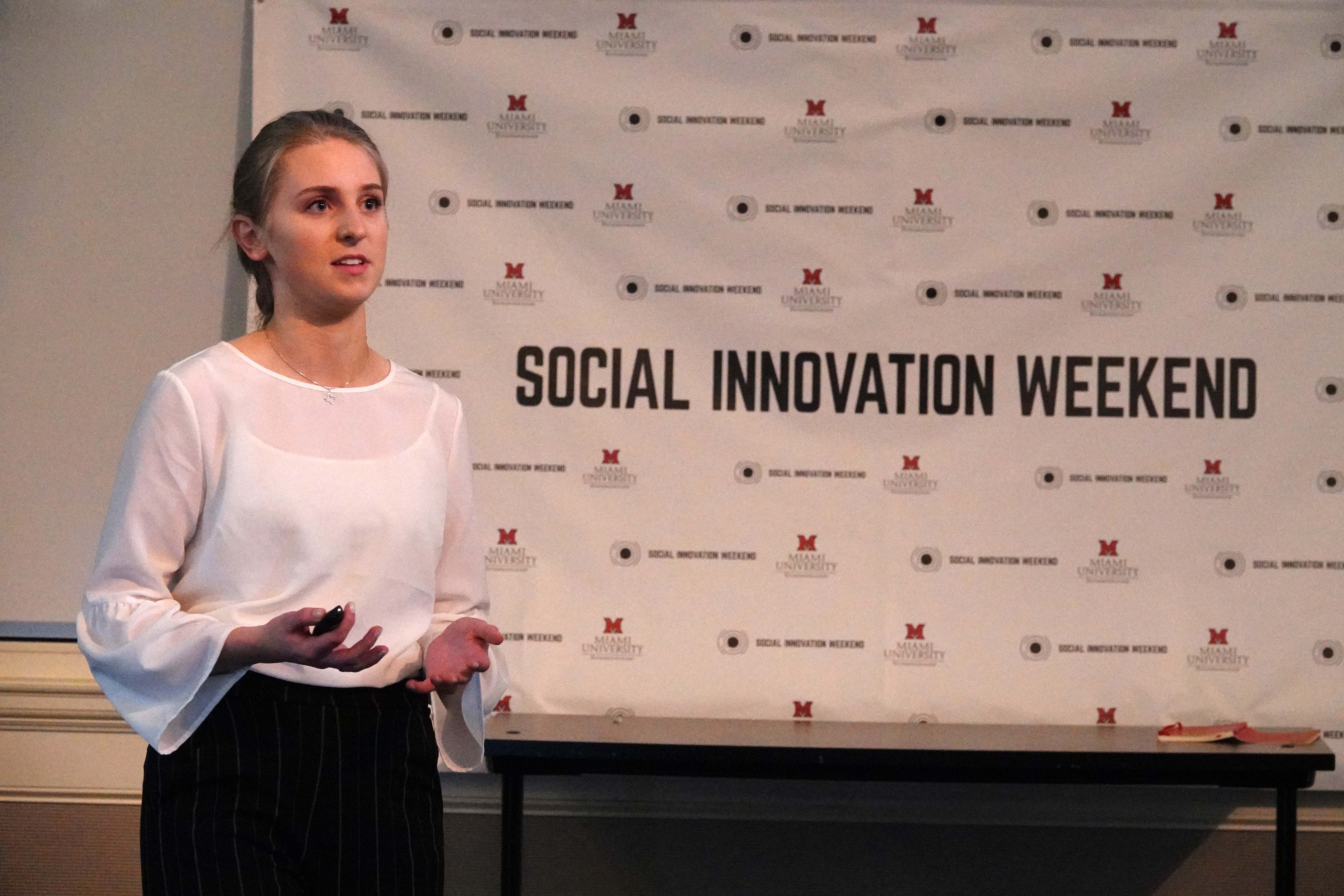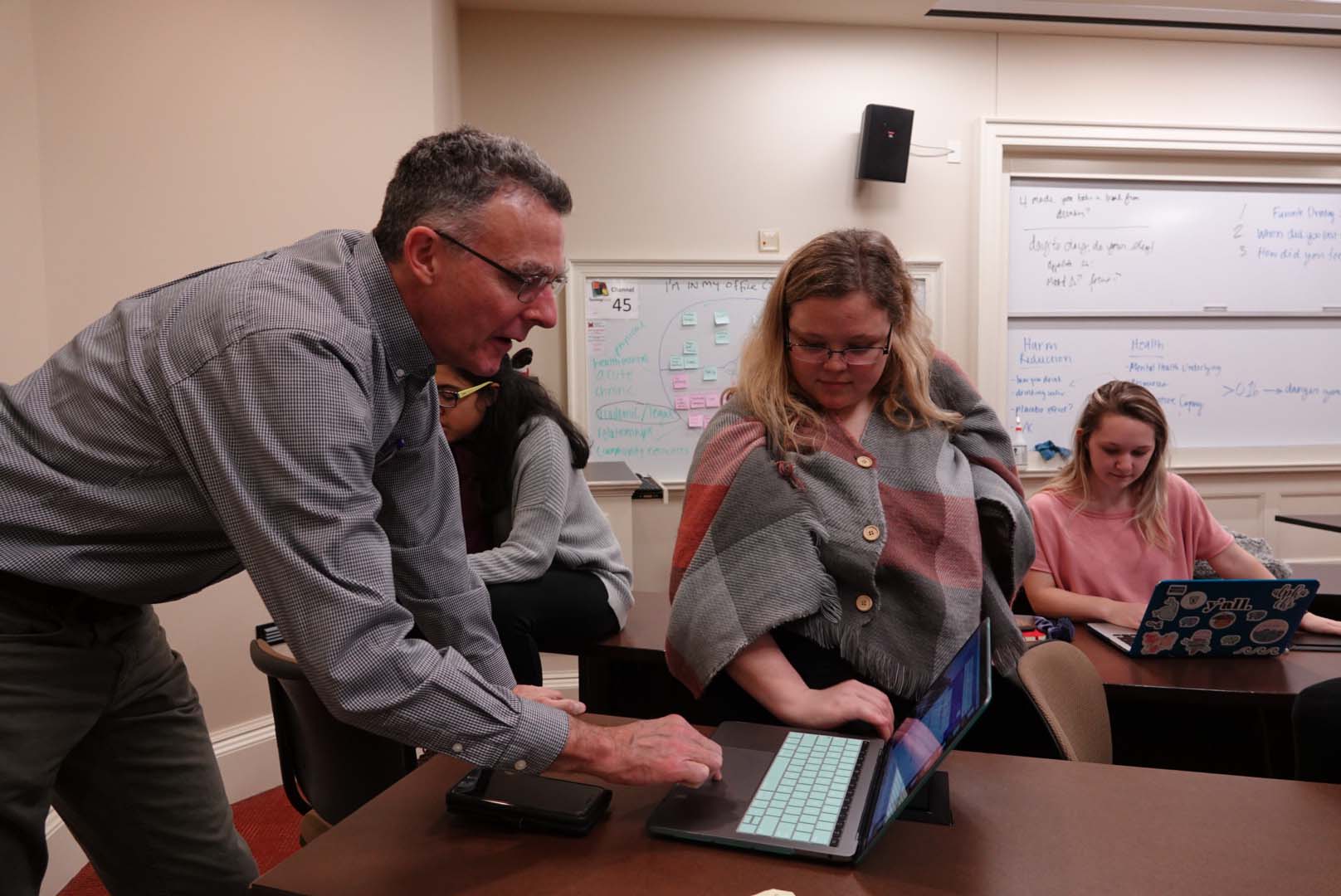Social Innovation Weekend seeks substance abuse solutions
More than 70 students take on challenge


More than 70 students take on challenge
Dennis Lowe, the commander of a Major Crimes Unit covering several southern Ohio counties, has spent nearly 30 years fighting against the supply of and demand for illegal drugs. He says that he’s come to realize that there isn’t a one-size-fits-all solution to the addiction and treatment problem many counties, cities, and organizations face.
“Everything we do should always be evaluated and looked at and thought about in terms of seeing if there are ways to make it better. What we need to be thinking about is that people are individuals, and they each need an individual plan,” he explained. “We can't just say ‘This treatment process works for all of the people who are on this drug,’ because that's not how it works. Everybody we encounter has a different barrier, a different obstacle to recovery. Everybody that we encounter is not going to make it through recovery.”
His words of wisdom went out to more than 70 Miami University students gathered in the Farmer School of Business. The students, covering more than 30 different majors, were there for Social Innovation Weekend, where they would attempt to find and create possible solutions that could help a half-dozen Butler County organizations tackle ongoing substance abuse, addiction, and treatment issues.
 “Taking students from diverse majors and backgrounds from across the university, teaching them some skills, giving them mentors, real-world problems, and seeing what they can come up with in 48 hours is pretty amazing,” anthropology chair and professor Cameron Hay-Rollins explained. “The ability to work with others with different ideas. The courage to take on really tough problems. The creativity to think outside the box and try to innovate, look at the problems from a different point of view and innovate new potential solutions.”
“Taking students from diverse majors and backgrounds from across the university, teaching them some skills, giving them mentors, real-world problems, and seeing what they can come up with in 48 hours is pretty amazing,” anthropology chair and professor Cameron Hay-Rollins explained. “The ability to work with others with different ideas. The courage to take on really tough problems. The creativity to think outside the box and try to innovate, look at the problems from a different point of view and innovate new potential solutions.”
More than a dozen teams gathered Friday evening to learn which of the organizations they would be working to help, then spent the weekend researching, ideating, and putting together a possible solution for one or more issues that their organization faced. After a preliminary round Sunday morning, the top four teams presented their ideas before all the judges, who voted on a first- and second-place winner.
The team of Jose Reyes, Billy Zhao, Rachel Barnett, Abby Gromek, John Giroux, and Matthew Sheely took first place for their idea Extend-a-Ride, a service designed to help addicts in recovery get to necessary appointments. Second place and the People’s Choice award went to SoBar, a non-alcoholic bar aimed at people who want the bar atmosphere and camaraderie without the temptation of alcohol. The SoBar team was Brad LaFountain, Breton Ballas, Jenna Walter, Hunter Saturn, Muhan Yu, and Tori Ward. Talia Abrams was given the Social Star award by the event’s mentors.
“This is the first time I've experienced a whole program geared towards fixing an actual, huge problem in our society,” Giroux noted. “The fact that Social Innovation Weekend exists shows that people want to care, and I think that's the start of making a real benefit for society.”
Senior international studies and supply chain major Colleen Evans said she got involved after she thought about what will happen after she graduates. “I thought, ‘I'm not going to have these cool opportunities. I need to start capitalizing on more things that Miami offers.’ It was definitely a sleep-deprived weekend, but definitely a very impactful and very cool weekend,” she said. “This has been one of my best group experiences at Miami. It was just really cool to be in a group where every single person was motivated and played to their strengths. Our group understood how to delegate, how to listen to each other and their ideas, which was really cool.”
“It's the best experience I've had in my life. Going forward with my plan to start my own non-profit in Cincinnati, I will take these tactics that I've learned and used here and implement them in the future, understanding marketing and understanding presentations to get my point across. I thought it had a great impact on me and my future,” sophomore black world studies major Niya Cunningham explained.
 The 30+ mentors who spent part of their weekend working with the students said they found it to be a rewarding experience as well. “I wasn't 100 percent sure what to expect, but the students completely blew me away with their creativity, the knowledge that they had of these issues that they pretty much had zero knowledge of 48 hours ago, was incredible,” Sweet Cheeks Diaper Bank CEO and founder Megan Fischer pointed out. “They really wanted to create something lasting that was going to improve someone else's life.”
The 30+ mentors who spent part of their weekend working with the students said they found it to be a rewarding experience as well. “I wasn't 100 percent sure what to expect, but the students completely blew me away with their creativity, the knowledge that they had of these issues that they pretty much had zero knowledge of 48 hours ago, was incredible,” Sweet Cheeks Diaper Bank CEO and founder Megan Fischer pointed out. “They really wanted to create something lasting that was going to improve someone else's life.”
“I think it's a great learning opportunity for the students to be challenged in a way that they wouldn't normally in a traditional academic setting. I think it's great for me personally, as I find it very engaging to talk to some of these people that are hungry,” NECCO chief financial officer Mark Davis said. “I like coaching people, so I like putting them in a situation where they've got to answer some tough questions and figure out how to handle that, because that's life.”
“What I saw here were students that have a passion for social impact, who were very entrepreneurial, and I think in this crowd, we've got some great future founders of enterprises, whether they be social impact or founders of the next big thing,” Flywheel executive director Bill Tucker said. “I was really impressed with the students here.”
The top six students from Social Innovation Weekend will receive a start-up fellowship from 17a, which involves mentoring and connections over several months. The students will have the flexibility to pursue any of the ideas presented or develop a new one. They will also receive $1000 that has been donated by the Klunk Family Foundation, which will be available for prototyping, investigation, development, etc. The hope is that this will allow the students to develop the idea to a point that it is ready for implementation.
For management and entrepreneurship assistant professor Chris Sutter, Social Innovation Weekend is an example of why he became the person he is today. “When somebody asks us, ‘Is there hope for somebody like me?’ the answer has to be ‘Yes.’ There can't be another answer than that. I'm proud and I’m honored to spend a weekend with you working on this. This is, for me, why I did the doctoral program. This is really why I'm here, and I thank you for that and for being a part of that. I thank our groups here that are in this day in and day out,” he told the students and mentors. “Thanks for taking the time this weekend. You had other options, but you chose to be here, and that says something. That says to me, ‘There's hope.’”
See more images from Social Innovation Weekend on our Facebook page


